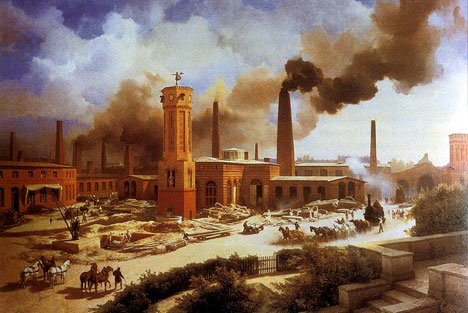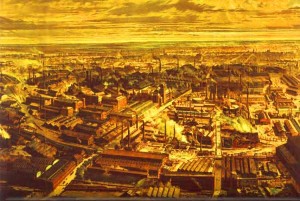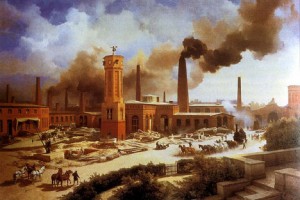 The Industrial Revolution changed society in the 19th century, shifting the lifestyles of hundreds of thousands from a dying feudalistic system to a new and untested capitalist society. Focusing on Great Britain, critics of industrialization noted the horrors of urbanization, the conditions of the working-class and other social problems and created several important responses that demonized and tried to solve the issues rooted in capitalistic free-market economics. The Industrial Revolution’s consequences are both positive and negative; increasing efficiency, technology and modernization has helped positively shape modern society but has also created a political and economic environment that inspires new socialist ideas. Epitomized by Marxism, these negative criticisms changed the course of history by shaping the events of the Russian Revolution and consequently unquestionably influencing the events of the 20th century, making Marxism the most influential by-product of the Industrial Revolution.
The Industrial Revolution changed society in the 19th century, shifting the lifestyles of hundreds of thousands from a dying feudalistic system to a new and untested capitalist society. Focusing on Great Britain, critics of industrialization noted the horrors of urbanization, the conditions of the working-class and other social problems and created several important responses that demonized and tried to solve the issues rooted in capitalistic free-market economics. The Industrial Revolution’s consequences are both positive and negative; increasing efficiency, technology and modernization has helped positively shape modern society but has also created a political and economic environment that inspires new socialist ideas. Epitomized by Marxism, these negative criticisms changed the course of history by shaping the events of the Russian Revolution and consequently unquestionably influencing the events of the 20th century, making Marxism the most influential by-product of the Industrial Revolution.
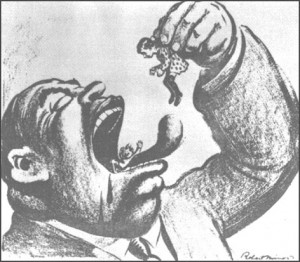 The industrialization of Great Britain began in the mid-18th century. Leading the Industrial Revolution, Britain was seen as “the workshop of the world” (759, Davies) beginning the shift from small cottage industries to the more grand scale of massive factories requiring large numbers of peasants to facilitate production of new factory goods. Its effect was unquestionable, “Europe vibrated with power as never before: with technical power, economic power, cultural power, intercontinental power” (pg 759, Davies). The massive exodus of workers into urban centres, such as Manchester, changed the social structure that left 19th century thinkers baffled and torn with what to make of this new revolutionary, new economic paradigm. With the hindsight of historians, one can easily say that, “No change in human life since the invention of agriculture, metallurgy, and towns in the New Stone Age has been so profound as the coming of industrialization” (764, Davies). In the economic sphere, the growth of the capitalist money economy turned self-sufficient agrarian peasants under feudalism into wage-earning consumers with new aspirations centred in urban communities such as Manchester and New Lanaark.
The industrialization of Great Britain began in the mid-18th century. Leading the Industrial Revolution, Britain was seen as “the workshop of the world” (759, Davies) beginning the shift from small cottage industries to the more grand scale of massive factories requiring large numbers of peasants to facilitate production of new factory goods. Its effect was unquestionable, “Europe vibrated with power as never before: with technical power, economic power, cultural power, intercontinental power” (pg 759, Davies). The massive exodus of workers into urban centres, such as Manchester, changed the social structure that left 19th century thinkers baffled and torn with what to make of this new revolutionary, new economic paradigm. With the hindsight of historians, one can easily say that, “No change in human life since the invention of agriculture, metallurgy, and towns in the New Stone Age has been so profound as the coming of industrialization” (764, Davies). In the economic sphere, the growth of the capitalist money economy turned self-sufficient agrarian peasants under feudalism into wage-earning consumers with new aspirations centred in urban communities such as Manchester and New Lanaark.
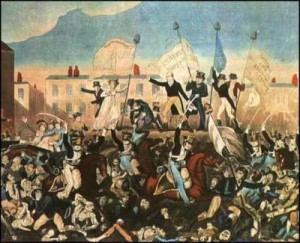 With the gradual decline of feudalism, a new business bourgeoisie emerged in Britain under the liberal-economic politics. Davies allots three stages of 19th century European society, “those of reaction (1815-48), reform (1848-71), and rivalry (1871-1914)” (763, Davies). The reactionary stage is a direct response to the actions of the emerging bourgeoisies. Although seen as greatly changing society for the better, introducing what was to be the ‘golden age’ of capitalism, there are reactions on both sides for and against one ideology; namely capitalist-economics perpetrated by the bourgeoisie. “The harsh economic conditions of early industrial capitalism produced a new era in social relations and political struggle” (454, Perspectives) which grew into a critique and call for complete change of the current system personified best in Marxism.
With the gradual decline of feudalism, a new business bourgeoisie emerged in Britain under the liberal-economic politics. Davies allots three stages of 19th century European society, “those of reaction (1815-48), reform (1848-71), and rivalry (1871-1914)” (763, Davies). The reactionary stage is a direct response to the actions of the emerging bourgeoisies. Although seen as greatly changing society for the better, introducing what was to be the ‘golden age’ of capitalism, there are reactions on both sides for and against one ideology; namely capitalist-economics perpetrated by the bourgeoisie. “The harsh economic conditions of early industrial capitalism produced a new era in social relations and political struggle” (454, Perspectives) which grew into a critique and call for complete change of the current system personified best in Marxism.
 As Adam Smith’s Wealth of Nations claims, laissez-faire economics was the best method for a nation’s growth. Believing that the government hindered progress, Smith vehemently opposed any involvement of the government and strictly opposed mercantilism, which was an early modern European economic theory that supported colonialism, which supplied goods to Britain from slave colonies. Unbeknownst to Smith even in the early stages of industrialization slavery had taken hold in Britain itself. Smith saw that the confusion of industrialization affected the masses of the working-class stating, “the interests of the labourer is strictly connected to that of the society, he is incapable either of comprehending the interest, or of understanding its connection with his own” (422, Smith). Adam Smith believed the working-class was incompetent and unable to see that their lives where ironically worse than the colonial slaves of Africa. Smith strongly agreed with benefits for the whole of society in constructing social structures but seemed to ignore the problems of the workers. The infamous ‘invisible hand’, he believed, would somehow benefit the workers through the overall social benefits created by constructing such social structures as “paved streets, city transport, street lighting, fire brigades, water works, gas works…hospitals, parks and police” (771, Davies). However, this was not actually the case. As Saint-Simon will point out, the working-class are only seen as an important tool in production.
As Adam Smith’s Wealth of Nations claims, laissez-faire economics was the best method for a nation’s growth. Believing that the government hindered progress, Smith vehemently opposed any involvement of the government and strictly opposed mercantilism, which was an early modern European economic theory that supported colonialism, which supplied goods to Britain from slave colonies. Unbeknownst to Smith even in the early stages of industrialization slavery had taken hold in Britain itself. Smith saw that the confusion of industrialization affected the masses of the working-class stating, “the interests of the labourer is strictly connected to that of the society, he is incapable either of comprehending the interest, or of understanding its connection with his own” (422, Smith). Adam Smith believed the working-class was incompetent and unable to see that their lives where ironically worse than the colonial slaves of Africa. Smith strongly agreed with benefits for the whole of society in constructing social structures but seemed to ignore the problems of the workers. The infamous ‘invisible hand’, he believed, would somehow benefit the workers through the overall social benefits created by constructing such social structures as “paved streets, city transport, street lighting, fire brigades, water works, gas works…hospitals, parks and police” (771, Davies). However, this was not actually the case. As Saint-Simon will point out, the working-class are only seen as an important tool in production.
 European observers were not always infatuated with the individualism and minimal government control that Adam Smith and the British economy supported. In Comete de Saint-Simon’s The Incoherence and Disorder of Industry, one can see that addressing the problems of the wage-labourers was not in the interests of the society as a whole because the interests of society were always directed to the industrialist bourgeoisie who controlled the means of production. Saint-Simon wrote that the bourgeoisie strives to attain capital at any cost, never attempting to address the problems of the poor in the wake of the great capitalist industrialization. “Laissez-faire, laissez passer! Such has been the inevitable solution” (446, Saint-Simon) noting that Smith blindly sees the positives of the new economics not respecting the effects it had on the worker. Stating that there are very grim results from capitalist-economics, Saint-Simon believed that there are “several fortunate individual triumphs…but the price is the complete ruin [for] innumerable victims” (446, Saint-Simon). Others would agree and expand on his thesis most notably Engels who vehemently opposed the social affects of industrialization.
European observers were not always infatuated with the individualism and minimal government control that Adam Smith and the British economy supported. In Comete de Saint-Simon’s The Incoherence and Disorder of Industry, one can see that addressing the problems of the wage-labourers was not in the interests of the society as a whole because the interests of society were always directed to the industrialist bourgeoisie who controlled the means of production. Saint-Simon wrote that the bourgeoisie strives to attain capital at any cost, never attempting to address the problems of the poor in the wake of the great capitalist industrialization. “Laissez-faire, laissez passer! Such has been the inevitable solution” (446, Saint-Simon) noting that Smith blindly sees the positives of the new economics not respecting the effects it had on the worker. Stating that there are very grim results from capitalist-economics, Saint-Simon believed that there are “several fortunate individual triumphs…but the price is the complete ruin [for] innumerable victims” (446, Saint-Simon). Others would agree and expand on his thesis most notably Engels who vehemently opposed the social affects of industrialization.
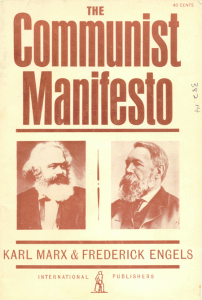 Urbanization brought with it a mass of new problems and a set of new social classes. By the 19th century, the old nobility and peasant distinctions were over turned by a new urban distinction between the middle class bourgeois and the working classes. A new concept of class was being based on economic terms of the rich and the poor. Some saw a new class-consciousness emerging, this would become the basis of Karl Marx’s The Communist Manifesto.
Urbanization brought with it a mass of new problems and a set of new social classes. By the 19th century, the old nobility and peasant distinctions were over turned by a new urban distinction between the middle class bourgeois and the working classes. A new concept of class was being based on economic terms of the rich and the poor. Some saw a new class-consciousness emerging, this would become the basis of Karl Marx’s The Communist Manifesto.
The transition from feudalism to industrialization produced relocation of masses of peasantry and with them came incredible suffering. The slums of Manchester best illustrate, as a microcosm of the modern world, the effects of industrialization on Britain. The squalor and grim industrial Manchester left no solace for a 10 hour-day working-class. With its incredible growth rate in the early and mid-19th century, a slew of new social, economic and political problems arose. Employers imposed horrible working conditions in factories only to increase production and lower marginal utility costs. Thanks to the ridiculous blindness of the bourgeois, this system of wage-labourers suffering continued inexorably in Manchester for decades. As Engels exposes the trappings of industrial production, it is easy to conclude that Karl Marx’s sympathy for the ‘proletariat’, as he called it, formed in the smoke clouds of dirty Manchester neighbourhoods.
In the wake of industrialization’s golden age, Engel’s observations of Manchester greatly help to solidify the ideas that he and Marx immortalized in the Communist Manifesto. Fredrick Engels’ wrote The Condition of the Working-Class in England in 1844, just four years before he and Karl Marx would produce the most influential pamphlet in modern history.
Engels, ironically, was the son of a German textile manufacturer and was affluent enough to write intellectual arguments that opposed the perceived immoral qualities of capitalism. His observations would become one of the most honest criticisms of the state of capitalist industrialization to date and would help shape the ideas that are expressed in the Communist Manifesto. Gathering his data in Manchester, Engels wrote of the filthy state of disorderly neighbourhoods full of filth and grime, which surround the “most horrible dwellings which [Engels] have yet beheld” (472, Engels). He saw a desperate impulse-ridden lifestyle, depression and cultural poverty lacking the foresight needed for freedom from their horrible capitalist enslavement. Engels noted more horrors writing of “foul pools of stagnant urine and excrement” (472, Engels) which can hardly be seen as humane in the eyes of honest hardworking industrialists such as Engels himself. This horrible new culture plays a key role in evoking a forceful response to these negative aspects of laissez-faire capitalism. In Engels, Manchester and the Working-Class, Manchester is seen as the “new kind of city in which the formation of a new kind of human world seemed to be occurring” (vii, Marcus) noting that “Manchester could be, and was, pointed to as the living embodiment of what was happening in the modern world.” (3, Marcus). As this embodiment, there is little good to be said of industrialization for the average working-class individual. Engels surveyed through the polluted, troubled waters of the Industrial Revolution studying urban sociology and observing the effects of laissez-faire economics. Engels wrote complaining of:
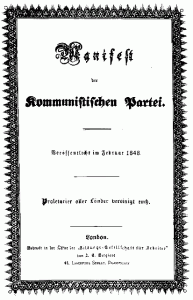 …the deepening suffering of the working-class…the increasing distance between and polarization of the working and middle classes [and] the deplorable ignorance of the middle class about the misery of their labouring countrymen. Hence, he writes, the “smiling indifference’ of the middle classes, even though ‘the ground beneath their feet is undermined and may give way at any minute.’ (143, Marcus)
…the deepening suffering of the working-class…the increasing distance between and polarization of the working and middle classes [and] the deplorable ignorance of the middle class about the misery of their labouring countrymen. Hence, he writes, the “smiling indifference’ of the middle classes, even though ‘the ground beneath their feet is undermined and may give way at any minute.’ (143, Marcus)
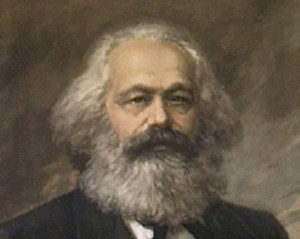 Engels believed and saw a great division between the two classes that became the common understanding of Marx as well. Engels complains about the concentration of the working-class and focuses on this to argue and indict the capitalists as immoral. By focusing on the worst aspects of industrialization seeing innocent people being engulfed in a world of starvation and dehumanization, Marx’s ideas grew from Engels observations becoming a powerful force for clarity in a confusing era of growth. Marx reread The Conditions of the Working-Class in England in 1863, and wrote to Engels, praising him for it and for how many of his analytical conclusion still made sense in its context (247, Marcus) clearly Marx was greatly influenced by Engels’ observations.
Engels believed and saw a great division between the two classes that became the common understanding of Marx as well. Engels complains about the concentration of the working-class and focuses on this to argue and indict the capitalists as immoral. By focusing on the worst aspects of industrialization seeing innocent people being engulfed in a world of starvation and dehumanization, Marx’s ideas grew from Engels observations becoming a powerful force for clarity in a confusing era of growth. Marx reread The Conditions of the Working-Class in England in 1863, and wrote to Engels, praising him for it and for how many of his analytical conclusion still made sense in its context (247, Marcus) clearly Marx was greatly influenced by Engels’ observations.
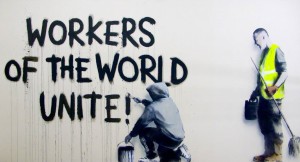 The most forceful and undeniably significant response to the economic horrors of the Industrial Revolution is Karl Marx’s and Frederick Engels’ pamphlet entitled The Communist Manifesto. The basic theory of The Communist Manifesto demonizes the owners of the ‘means of production’, calling for a proletarian revolution, which would institute the elimination of private property and have a government in complete control of industry. These radical ideas were obviously antagonistic to the ideology of laissez-faire capitalism. Focusing largely on economic terms, Marx simplified what was happening in England. Marxism seemed to be brewed as passionate ideology fuelled by emotional rhetoric that was based upon the injustices perpetrated by the middle-class bourgeoisie during the Industrial Revolution. The rhetoric of some of the most famous phrases of The Communist Manifesto speaks of this appeal to emotions: “The proletarians have nothing to lose but their chains. They have a world to win. Working Men of All Countries, Unite!” (77, Marx). This cry for justice seemed so profound that its underlying implications were ignored for what it meant in the eyes of the working-class.The Communist Manifesto speaks of unquestionably inevitable change that ironically never came in England largely because of consistent reforms and other socialist movements, such as Chartism, but appeared else where in the most improbable of places.
The most forceful and undeniably significant response to the economic horrors of the Industrial Revolution is Karl Marx’s and Frederick Engels’ pamphlet entitled The Communist Manifesto. The basic theory of The Communist Manifesto demonizes the owners of the ‘means of production’, calling for a proletarian revolution, which would institute the elimination of private property and have a government in complete control of industry. These radical ideas were obviously antagonistic to the ideology of laissez-faire capitalism. Focusing largely on economic terms, Marx simplified what was happening in England. Marxism seemed to be brewed as passionate ideology fuelled by emotional rhetoric that was based upon the injustices perpetrated by the middle-class bourgeoisie during the Industrial Revolution. The rhetoric of some of the most famous phrases of The Communist Manifesto speaks of this appeal to emotions: “The proletarians have nothing to lose but their chains. They have a world to win. Working Men of All Countries, Unite!” (77, Marx). This cry for justice seemed so profound that its underlying implications were ignored for what it meant in the eyes of the working-class.The Communist Manifesto speaks of unquestionably inevitable change that ironically never came in England largely because of consistent reforms and other socialist movements, such as Chartism, but appeared else where in the most improbable of places.
 With the messages of the Communist Party revealed in The Communist Manifesto, the public slowly became aware of the basic principles known as Marxism Communism, although “the initial impact was largely in Germany” (15, Marx) according to the introduction of The Communist Manifesto by Hobsbawm. Writing in the heat of the moment and on the verge of a German Revolution in 1848, Marx later revised his predictions after the German Revolution proved unsuccessful. This might suggest thatThe Communist Manifesto seems to have been “a historic document which we have no right to change” (87, Marx) according to what Engels wrote years after its publication. Instead of being seen as simply a historic commentary of industrialization, its revolutionary rhetoric made Marxism a tool for change in the least likely of places; namely Russia.
With the messages of the Communist Party revealed in The Communist Manifesto, the public slowly became aware of the basic principles known as Marxism Communism, although “the initial impact was largely in Germany” (15, Marx) according to the introduction of The Communist Manifesto by Hobsbawm. Writing in the heat of the moment and on the verge of a German Revolution in 1848, Marx later revised his predictions after the German Revolution proved unsuccessful. This might suggest thatThe Communist Manifesto seems to have been “a historic document which we have no right to change” (87, Marx) according to what Engels wrote years after its publication. Instead of being seen as simply a historic commentary of industrialization, its revolutionary rhetoric made Marxism a tool for change in the least likely of places; namely Russia.
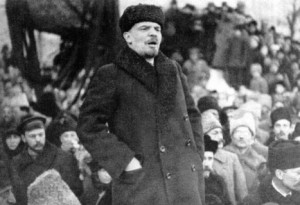 Emerging in the backwater, un-industrialized and largely rural nation of Russia, Marxism clearly shaped the progression of the 20thcentury. With the beginning of the Great War in 1914, a new violent context helped create a Russian Revolution based primarily on the rhetoric and ideology of Karl Marx; whose ideas fit much more closely in the context of the Industrial Revolution than the Great War and Russia. It becomes clear that, as Leopold Schwarzschild argues in The Red Prussian, “the most important facts of our time lead back to one man-Karl Marx” (7, Schwarzschild) the Industrial Revolution is at the heart of influence. As history reveals, “It will hardly be disputed that it is [Marx] who is manifested in the very existence of Soviet Russia, and particularly in the Soviet methods.” (7, Schwarzschild). As Davies suggests, “the [19th] century began in the aftermath of one revolution, in France, and ended in the prelude to another revolution, in Russia”(759, Davies), which is a direct result of Marxism whose design and shape was created not in the context of the 20th century but in the context of the Industrial Revolution in Great Britain and to a lesser extent other European nations.
Emerging in the backwater, un-industrialized and largely rural nation of Russia, Marxism clearly shaped the progression of the 20thcentury. With the beginning of the Great War in 1914, a new violent context helped create a Russian Revolution based primarily on the rhetoric and ideology of Karl Marx; whose ideas fit much more closely in the context of the Industrial Revolution than the Great War and Russia. It becomes clear that, as Leopold Schwarzschild argues in The Red Prussian, “the most important facts of our time lead back to one man-Karl Marx” (7, Schwarzschild) the Industrial Revolution is at the heart of influence. As history reveals, “It will hardly be disputed that it is [Marx] who is manifested in the very existence of Soviet Russia, and particularly in the Soviet methods.” (7, Schwarzschild). As Davies suggests, “the [19th] century began in the aftermath of one revolution, in France, and ended in the prelude to another revolution, in Russia”(759, Davies), which is a direct result of Marxism whose design and shape was created not in the context of the 20th century but in the context of the Industrial Revolution in Great Britain and to a lesser extent other European nations.
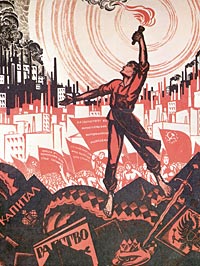 Long after Marx died, his ideas became the most influential of the 20th century, allowing for a totalitarian regime to emerge in Russia. “Once the Industrial Revolution was in motion, a long series of consequences ensued” (771, Davies), its most significant consequence being that of Marxism and subsequently Soviet Russia. “Without Marx there would have been no Lenin, without Lenin no communist Russia…There can be no doubt that our whole life would be very different if Marx had never lived” (7, Schwarzschild). Without an Industrial Revolution, then, there would be no Marxist ideology to speak of today and any subsequent history would be altered beyond recognition. Lenin’s Bolsheviks adopted Marxism as a means to a new social structure in Russia and skewed the details of Marxism because they were taken from the context of the factories of Industrial Revolution. First used by Lenin then Stalin, Marxism created a powerful force in the 20th century that threatened both Fascism and Capitalism on a world stage.
Long after Marx died, his ideas became the most influential of the 20th century, allowing for a totalitarian regime to emerge in Russia. “Once the Industrial Revolution was in motion, a long series of consequences ensued” (771, Davies), its most significant consequence being that of Marxism and subsequently Soviet Russia. “Without Marx there would have been no Lenin, without Lenin no communist Russia…There can be no doubt that our whole life would be very different if Marx had never lived” (7, Schwarzschild). Without an Industrial Revolution, then, there would be no Marxist ideology to speak of today and any subsequent history would be altered beyond recognition. Lenin’s Bolsheviks adopted Marxism as a means to a new social structure in Russia and skewed the details of Marxism because they were taken from the context of the factories of Industrial Revolution. First used by Lenin then Stalin, Marxism created a powerful force in the 20th century that threatened both Fascism and Capitalism on a world stage.
In Tzvetan Todorov’s Hope and Memory, one is quickly introduced to the most influential aspects of 20th century history in the form of totalitarianism. These totalitarian regimes in Marx’s homeland of Germany and, of course, Soviet Russia shaped much of 20th century history according to Hope and Memory. Todorov states the reality of Marxism saying:
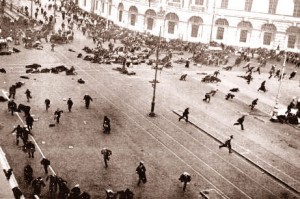 The Soviet Russia, which came to being in 1917, killed five million in the ensuing civil war and in the famine of 1922, four million in the course of political repression, and another six million in the artificial famine of 1932-33. The Second World War brought about the deaths of at least thirty-five million people in Europe alone (twenty-five million of them in the Soviet Union)…(5, Todorov).
The Soviet Russia, which came to being in 1917, killed five million in the ensuing civil war and in the famine of 1922, four million in the course of political repression, and another six million in the artificial famine of 1932-33. The Second World War brought about the deaths of at least thirty-five million people in Europe alone (twenty-five million of them in the Soviet Union)…(5, Todorov).
Clearly, the Soviet Union, which was born under the premise of Marxism, had a great influence at home and subsequently abroad with the events of the Second World War and the consequential Cold War. As a force of change, Communism, developed by Marx, reshaped the trajectory of world history. Ironically its ideals sprung from a completely different part of the world were industrialization personified the enemy.
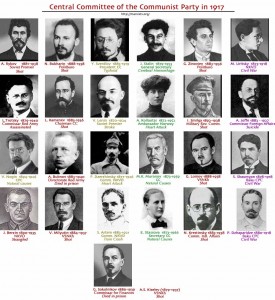 Surveying the Industrial Revolution, one can see that the most influential by-product of its development was Marxism, which would go on to define the events of the 20th century. As a time of great change the Industrial Revolution altered society creating new breads of socialist ideology that changed the course of history. The negative affects of industrialization, as observed in Great Britain, stimulated several forceful responses that showed capitalistic free-market economics as a deeply immoral development revealing in its analyses a hopeful dream of something better and more desirable in the form of Communism.
Surveying the Industrial Revolution, one can see that the most influential by-product of its development was Marxism, which would go on to define the events of the 20th century. As a time of great change the Industrial Revolution altered society creating new breads of socialist ideology that changed the course of history. The negative affects of industrialization, as observed in Great Britain, stimulated several forceful responses that showed capitalistic free-market economics as a deeply immoral development revealing in its analyses a hopeful dream of something better and more desirable in the form of Communism.
Works Cited
-
Davies, Norman. Europe: A History. Pimlico, London, 1997, pp. 759-802
-
Engels, Fredrick. The Condition of the Working Class in England. Perspectives from the Past: Primary Sources in Western Civilizations, vol. 2. James M. Brophy, et al, eds. W. W. Norton & Company Inc, New York, 2002, pp. 473-474
-
Marx, Karl & Engels, Frederick. The Communist Manifesto: A Modern Edition.Verso, London, reprinted 2001.
-
Marcus, Steven. Engels, Manchester and the Working-Class. Random House, New York, 1974.
-
Saint-Simon. The Incoherence and Disorder of Industry. Perspectives from the Past: Primary Sources in Western Civilizations, vol. 2. James M. Brophy, et al, eds. W. W. Norton & Company Inc, New York, 2002, pp. 444-446.
-
Schwarzschild, Leopold. The Red Prussian: The Life and Legend of Karl Marx.Hamish Hamilton, London, 1947.
-
Smith, Adam. The Wealth of Nations. Perspectives from the Past: Primary Sources in Western Civilizations, vol. 2. James M. Brophy, et al, eds. W. W. Norton & Company Inc, New York, 2002, pp. 420-425
-
Todorov, Tzvetan. Hope and Memory: Lessons from the Twentieth Century. Princeton University Press, Princeton, 2003.

